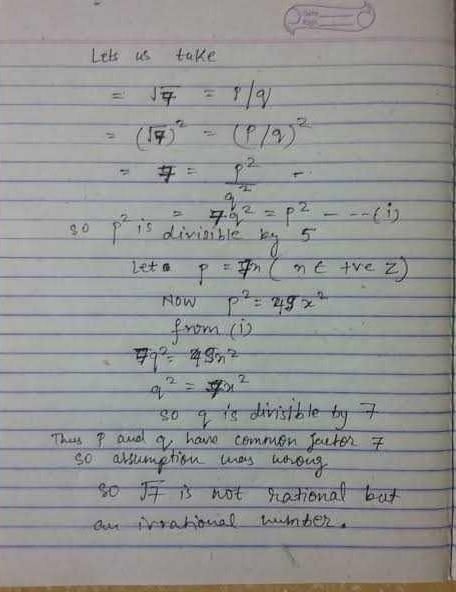Class 10 Exam > Class 10 Questions > √7 isa)an integerb)an irrational number...
Start Learning for Free
√7 is
- a)an integer
- b)an irrational number
- c)a rational number
- d)none of these
Correct answer is option 'B'. Can you explain this answer?
Verified Answer
√7 isa)an integerb)an irrational numberc)a rational numberd)none...
Lets assume that √7 is rational number. ie √7=p/q.
suppose p/q have common factor then
we divide by the common factor to get √7 = a/b were a and b are co-prime number.
that is a and b have no common factor.
√7 =a/b co- prime number
√7= a/b
a=√7b
squaring
a^2=7b^2 ....1
a� is divisible by 7
a=7c
substituting values in 1
(7c)^2=7b^2
49c^2=7b^2
7c^2=b^2
b^2=7c^2
b^2 is divisible by 7
that is a and b have atleast one common factor 7. This is contridite to the fact that a and b have no common factor.This is happen because of our wrong assumption.
√7 is irrational.
Most Upvoted Answer
√7 isa)an integerb)an irrational numberc)a rational numberd)none...

Free Test
FREE
| Start Free Test |
Community Answer
√7 isa)an integerb)an irrational numberc)a rational numberd)none...
Let us assume that root 7 is a rational number,
or,√7=p/q--(1).( where p and q are coprime integers and q is not equal to zero),
squaring both side in equation 1.
7=p²/q²,
7q²=p²--(2),
from( 2 ).7 is a factor of p square it means it is also divisible by p,
put p=7min (2).
7q²=49m²,
q²=7m²--(3).
from (3) 7 is a factor of q square it means it is also divisible by q,
and from two and three we can say that P and Q have a common factor 7 hence it contradict our assumption that p and q are coprime integers,
hence √7 is irrational
or,√7=p/q--(1).( where p and q are coprime integers and q is not equal to zero),
squaring both side in equation 1.
7=p²/q²,
7q²=p²--(2),
from( 2 ).7 is a factor of p square it means it is also divisible by p,
put p=7min (2).
7q²=49m²,
q²=7m²--(3).
from (3) 7 is a factor of q square it means it is also divisible by q,
and from two and three we can say that P and Q have a common factor 7 hence it contradict our assumption that p and q are coprime integers,
hence √7 is irrational

|
Explore Courses for Class 10 exam
|

|
Question Description
√7 isa)an integerb)an irrational numberc)a rational numberd)none of theseCorrect answer is option 'B'. Can you explain this answer? for Class 10 2025 is part of Class 10 preparation. The Question and answers have been prepared according to the Class 10 exam syllabus. Information about √7 isa)an integerb)an irrational numberc)a rational numberd)none of theseCorrect answer is option 'B'. Can you explain this answer? covers all topics & solutions for Class 10 2025 Exam. Find important definitions, questions, meanings, examples, exercises and tests below for √7 isa)an integerb)an irrational numberc)a rational numberd)none of theseCorrect answer is option 'B'. Can you explain this answer?.
√7 isa)an integerb)an irrational numberc)a rational numberd)none of theseCorrect answer is option 'B'. Can you explain this answer? for Class 10 2025 is part of Class 10 preparation. The Question and answers have been prepared according to the Class 10 exam syllabus. Information about √7 isa)an integerb)an irrational numberc)a rational numberd)none of theseCorrect answer is option 'B'. Can you explain this answer? covers all topics & solutions for Class 10 2025 Exam. Find important definitions, questions, meanings, examples, exercises and tests below for √7 isa)an integerb)an irrational numberc)a rational numberd)none of theseCorrect answer is option 'B'. Can you explain this answer?.
Solutions for √7 isa)an integerb)an irrational numberc)a rational numberd)none of theseCorrect answer is option 'B'. Can you explain this answer? in English & in Hindi are available as part of our courses for Class 10.
Download more important topics, notes, lectures and mock test series for Class 10 Exam by signing up for free.
Here you can find the meaning of √7 isa)an integerb)an irrational numberc)a rational numberd)none of theseCorrect answer is option 'B'. Can you explain this answer? defined & explained in the simplest way possible. Besides giving the explanation of
√7 isa)an integerb)an irrational numberc)a rational numberd)none of theseCorrect answer is option 'B'. Can you explain this answer?, a detailed solution for √7 isa)an integerb)an irrational numberc)a rational numberd)none of theseCorrect answer is option 'B'. Can you explain this answer? has been provided alongside types of √7 isa)an integerb)an irrational numberc)a rational numberd)none of theseCorrect answer is option 'B'. Can you explain this answer? theory, EduRev gives you an
ample number of questions to practice √7 isa)an integerb)an irrational numberc)a rational numberd)none of theseCorrect answer is option 'B'. Can you explain this answer? tests, examples and also practice Class 10 tests.

|
Explore Courses for Class 10 exam
|

|
Signup for Free!
Signup to see your scores go up within 7 days! Learn & Practice with 1000+ FREE Notes, Videos & Tests.
























